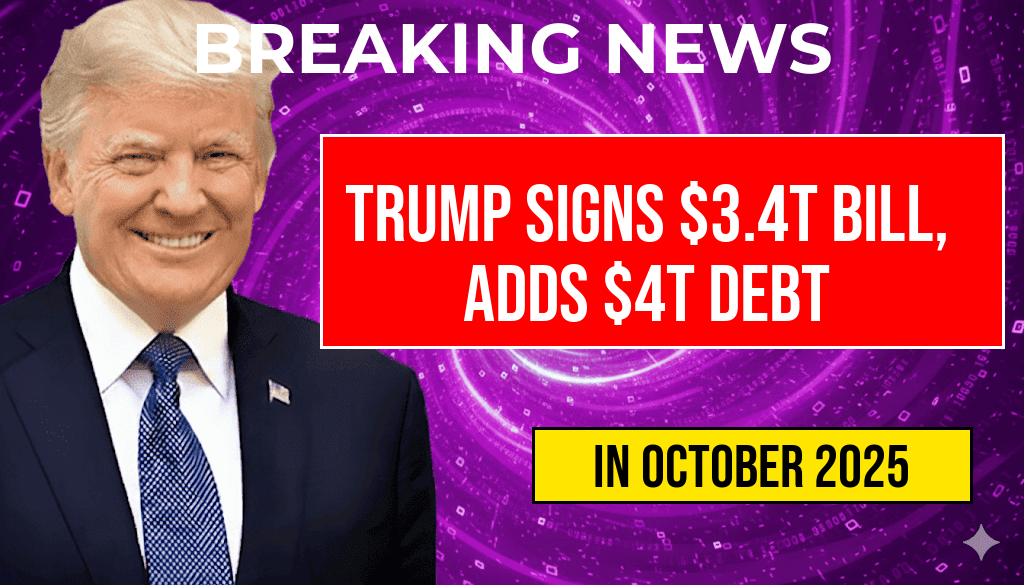Trump Signs $3.4 Trillion Mega-Bill, Adding $4 Trillion to National Debt While Promising No Tax on Tips
A sweeping legislative package totaling approximately $3.4 trillion has been signed into law by former President Donald Trump, marking one of the largest spending measures in recent U.S. history. The bill, which encompasses a broad array of federal programs and initiatives, is projected to increase the national debt by nearly $4 trillion, raising concerns among economists and policymakers about long-term fiscal sustainability. Despite the scale of the spending, Trump emphasized that the legislation would not impose new taxes on tips, aiming to appeal to small business owners and service industry workers.
The legislation’s passage underscores a continued debate over fiscal responsibility and economic stimulus strategies, especially amid ongoing recovery efforts from the COVID-19 pandemic, inflationary pressures, and geopolitical tensions. While supporters argue that the bill injects vital funding into infrastructure, health care, and defense, critics warn that ballooning debt could burden future generations and destabilize financial markets if not managed carefully.
Details of the Mega-Bill and Its Fiscal Impact
The bill’s comprehensive scope covers numerous sectors, including infrastructure modernization, healthcare expansion, education funding, and defense. Its estimated cost, approximately $3.4 trillion, is projected to be offset by a combination of revenue provisions and deficit-financing measures, yet the Congressional Budget Office (CBO) estimates that the legislation will add nearly $4 trillion to the national debt over the next decade due to increased spending and limited immediate revenue increases.
| Aspect | Amount / Effect |
|---|---|
| Total Spending | $3.4 trillion |
| Projected Increase in National Debt | $4 trillion |
| Focus Areas | Infrastructure, healthcare, education, defense |
| Revenue Measures | Limited, includes tax enforcement and closing loopholes |
The bill also includes targeted tax provisions aimed at high-income earners and corporations, but notably excludes any new taxing measures on tips, a decision that drew both praise and criticism. Small business advocates and service industry representatives welcomed the assurance, arguing that additional tax burdens could jeopardize livelihoods and economic growth in sectors like hospitality, food service, and retail.
Political and Economic Reactions
The legislative move has sparked a flurry of reactions across the political spectrum. Supporters, including many Republican leaders, describe the bill as a necessary investment in America’s future, emphasizing that it will create jobs, improve infrastructure, and enhance national security. Senate Minority Leader Mitch McConnell stated, “This legislation reflects a commitment to rebuilding our country, and we are pleased it avoids new taxes on tips for hardworking Americans.”
Conversely, Democrats and fiscal conservatives expressed concern over the bill’s size and its long-term implications. Senator Elizabeth Warren criticized the legislation as a “reckless borrowing spree,” warning that the added debt could lead to higher interest rates and inflation. Economists from institutions like the Peterson Institute for International Economics have also questioned whether such expansive spending can be effectively managed without fueling economic instability.
The White House, in a statement, maintained that the bill was “fiscally responsible,” emphasizing its focus on economic growth and targeted tax enforcement. The administration also highlighted that no new taxes would be levied on tips, a measure designed to protect millions of service workers from additional financial burdens.
Implications for the U.S. Economy and Future Policy
The signing of this mega-bill arrives at a critical junction for U.S. fiscal policy. While the immediate infusion of funds is expected to stimulate economic activity and address infrastructure needs, the swelling debt raises questions about sustainability and future policy options.
Analysts warn that increased borrowing could lead to higher interest costs, potentially diverting resources from other priorities. The Congressional Research Service notes that sustained high levels of debt might dampen economic growth and limit policymakers’ flexibility in responding to future crises.
Moreover, the decision to exclude taxes on tips signals an awareness of the political and economic sensitivities surrounding small businesses and workers in the service industry. According to the Bureau of Labor Statistics, tips represent a significant portion of income for millions, making tax policies in this area particularly impactful.
As debates continue over fiscal responsibility and economic strategy, the bill’s long-term effects will likely shape the legislative landscape for years to come. Stakeholders across sectors will be watching closely to see how the administration manages the balance between stimulus and sustainability.
External Sources
- National Debt of the United States – Wikipedia
- The Impact of Large Legislative Spending Bills on the Economy – Forbes
- Congressional Budget Office – Cost Estimate of Legislation
Frequently Asked Questions
What is the main purpose of the $3.4 trillion mega-bill signed by Trump?
The mega-bill aims to fund various government initiatives, including infrastructure, healthcare, and economic relief measures, while significantly increasing the national debt by adding approximately $4 trillion.
How does the bill impact the national debt?
The bill is projected to add around $4 trillion to the national debt, raising concerns about long-term fiscal sustainability and the country’s financial stability.
Does the bill include any provisions related to taxes on tips?
Yes, President Trump has promised that the bill will not impose taxes on tips, ensuring that service workers’ earnings are protected from new tax burdens.
What are the potential economic implications of the increased national debt?
The increase in national debt could lead to higher interest rates, inflation, and future budget constraints, potentially affecting economic growth and public services.
How has the bill been received by different political groups?
The bill has received mixed reactions, with supporters highlighting its funding priorities, while critics express concerns over the substantial debt increase and long-term fiscal impact.

Leave a Reply